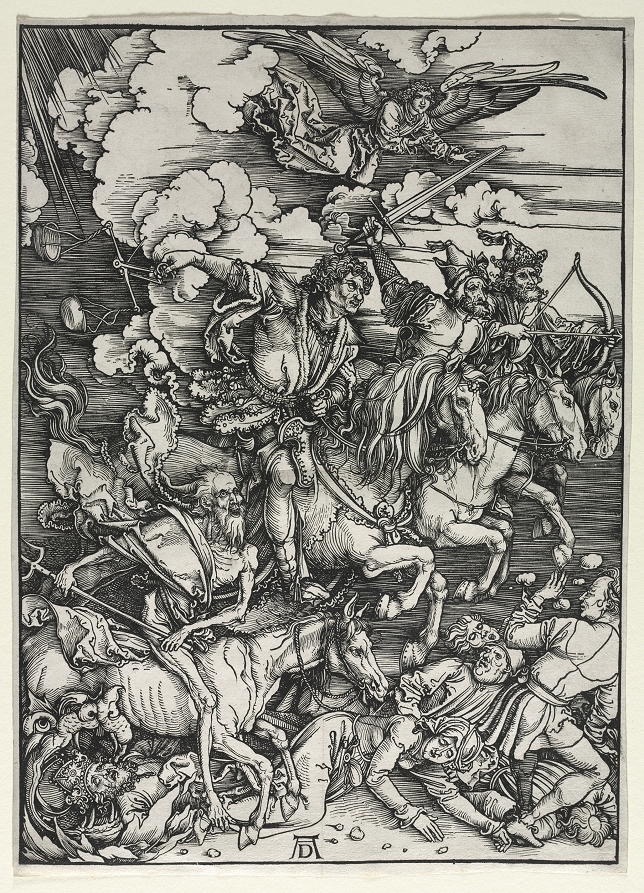Clicks

Albrecht Dürer:
The Four Horsemen, from The Apocalypse (c. 1498)
"How do I compare thee to a provocative headline?"
The cynicism in this world expands at an ever-expanding rate. What passed for crass fifty years ago will hardly make noteworthy today. From Fuck Biden bumper stickers to clickbait social media headlines, today's world trades in raw attention—the less refined, the better. Publishing, too, has fallen prey to these emerging values—if I dare use value to describe what I see happening inside. Almost twenty years ago, some brilliant upstart experienced a revelation. Where Publishing had forever focused on distributing content as its purpose, an emergent goal appeared: attention. On the internet, the Click became the metric and the purpose, and everything was or would eventually be distributed via the internet. A hollow piece with an attractive title would easily attract more attention than any unprovocative, thoughtful piece. First one, then almost all others began focusing their attention upon attracting attention, upon encouraging Clicks. The brilliant insight centered around the realization that Clicks pay, but content doesn't.
At first, It didn't matter how long attention focused on any individual item. Engagement came later as a refinement to raw attraction. Still, the Clicks remain preeminent, for, without the provocation, little could happen. Upstarts could count their revenues in hundreds of millions of dollars without ever needing to worry about the quality of their content. As we all understand, those clickbait headlines often promised more than they ever delivered. They'd promise to tell everything anyone ever needed to know about the life of Del Shannon and, more often than not, fail to produce the goods. They'd deliver instead some windy thread so broken up with advertisements that few could ever find their way to the bottom of it. One was supposed to get newly distracted by some even more alluring attraction along the way, the effect of which produced exponential Clicks and even more significant revenues for the Publisher. This form, once the rage, has now become the norm.
And what about my pages? They have yet to go viral. I'm not above provocative titles, but I'm also not quite beneath still believing that content somehow matters. I understand that not every one of my stories stands above all the others. Each, though, does hold a purpose above and beyond attracting Clicks. So much the worse for this author, who might have otherwise become a TicTok millionaire, famous for producing short format content, enormously satisfying thirty-second glimpses into nothing in particular: popcorn. The wizards who imagine and measure such things have metrics that show what we all should know became true long ago. Content's for suckers. Clicks produce the gravy.
One of the famed Horsemen of the Apocalypse rode a pony like this. He eschewed whatever his forebears valued in favor of temporal satisfactions. The new sin was not sloth but to labor under dedicated misconception and focus on content rather than clickbait attractions. The promises unfulfilled prove far more profitable. The sense that all customers are at root suckers expands to fill the void goodwill left when it fled from the hoard. The designer, the publisher, becomes indistinguishable from any cut-rate demon dealing in glitz and mammon. Intentions don't matter when competing for Clicks. Decency loses purpose when content's no longer even a prince in the realm, much less king. A writer becomes merely clever, capable of fooling almost anyone at any time, and damned proud of their accomplishment. Supper porn, sunsets, and celebrity sex scandals attract more Clicks than even the best of Shakespeare's sonnets.
"How do I compare thee to a provocative headline?
Let me count the Clicks."
©2023 by David A. Schmaltz - all rights reserved


